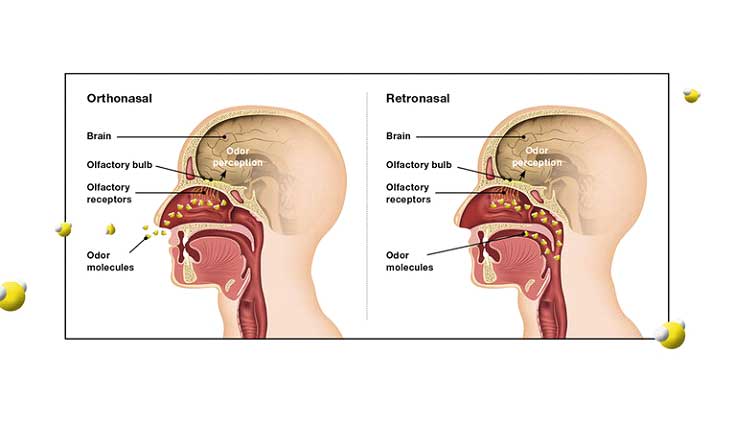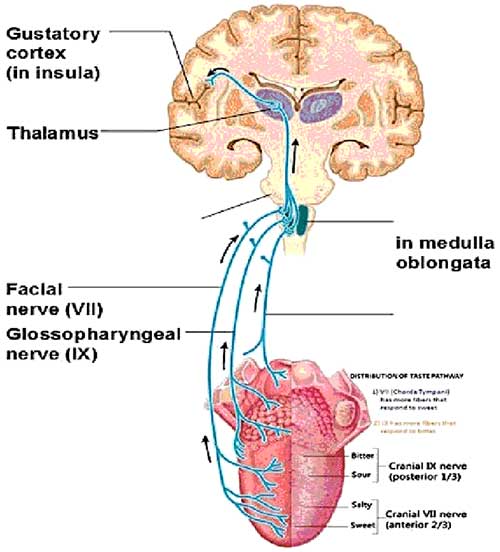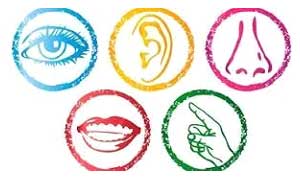Food and Brain
The smell of food and the mechanism by which our brain processes it has a significant role in the way we enjoy our food. The olfactory bulb located behind our nasal cavity has nerves that are sensitive to different smells and this information is transmitted to the brain. Our sense of smell affects the way we enjoy our food.
There are two ways by which information on smell is transmitted to the brain:

- The Orthonasal Route – We breathe in something and that information is sent to the brain.
- The Retronasal Route – We eat something and the process of chewing releases odor molecules that reach our nostrils.
Irrespective of the pathway, the smell of food along with the taste experienced by our taste buds, moulds our attitude towards food. According to research, a duration of 110 milliseconds is all it takes for people to recognize a particular smell.
Taste buds present at the back of the tongue help us detect the five different tastes – sweet, sour, bitter, salty and umami. Flavour on the other hand refers to not only taste but also the consistency and fragrance of food. Both smell and flavour are interlinked and exert a huge influence on our food perception.
When we chew food, molecules are released which affect the gustatory cells of the taste buds. Every taste bud contains sensory cells, which react to the five different tastes mentioned earlier. Taste identification happens all over the tongue and is not restricted to certain parts of it alone. Thus, the taste map that people have followed in the past, now no longer holds good.

When taste receptor cells identify a particular taste, they communicate this to the brain via three cranial nerves which are the facial, glossopharyngeal and vagus nerves. These signals pass by way of the thalamus which conveys sensory information to different brain regions. At the gustatory cortex and the insula, the exact taste identification takes place.
When we fall sick with a cold, we feel we can no longer taste food or rather we are unable to detect taste. This is because with a blocked nose during a cold, we are unable to identify smell and we identify taste alone. But we need both taste and smell to enjoy food. In fact, certain regions of the brain respond only to a taste-smell combination. Even during the COVID pandemic, there was a lot of interest about the loss of smell as a hallmark feature or as a warning.

Aging affects both our taste and smell. The cells that react to flavour and odor are exposed to the external environment and hence more at risk of damage. So, these cells have the capability to regenerate. But with age, these injured cells are not capable of regeneration which is why the ability to respond to taste and smell changes.
Loss of smell in older people sometimes could be a marker for neurodegenerative conditions such as Parkinson’s disease or dementia. In fact, loss of smell in Parkinson’s disease occurs many years before the onset of motor symptoms and signs and thus in the neurology world, we use a test called UPSIT (University of Pennsylvania Smell Identification Test).
The ability to experience different smells adds to the flavour of food. When people are exposed to complementary flavour pairings, their perception of flavour is enhanced. For example, the taste of sugar is heightened when we experience it along with the smell of strawberries. Conversely, its taste is reduced when experienced with the smell of peanut butter. Thus, thanks to chemical receptors and the networking in the brain that helps us identify various flavours and odors, we are able to fully appreciate the food we eat.
Food, in general tickles all our senses!!
The sight, smell, sounds of preparation, the texture and the taste all together make us happy when we talk about food. It evokes dopamine – the hormone of happiness.

“People who love to eat are always the best people.”
These famous words by Julia Child perfectly describe all foodies’ thoughts and feelings. Eating is not only for the body but also the mind as eating together and sharing meals is a wonderful way to bond. Food is also an integral part of festivals and celebrations and we automatically connect happy occasions to the wonderful food we had.
It is also important to eat a healthy and balanced diet to keep ourselves mentally and physically healthy. Too much of anything is not acceptable, so eat healthy and stay healthy.

Dr. Bhuvaneshwari Rajendran
Senior Consultant Neurology and Neurophysiology
Kauvery Hospital, Chennai

